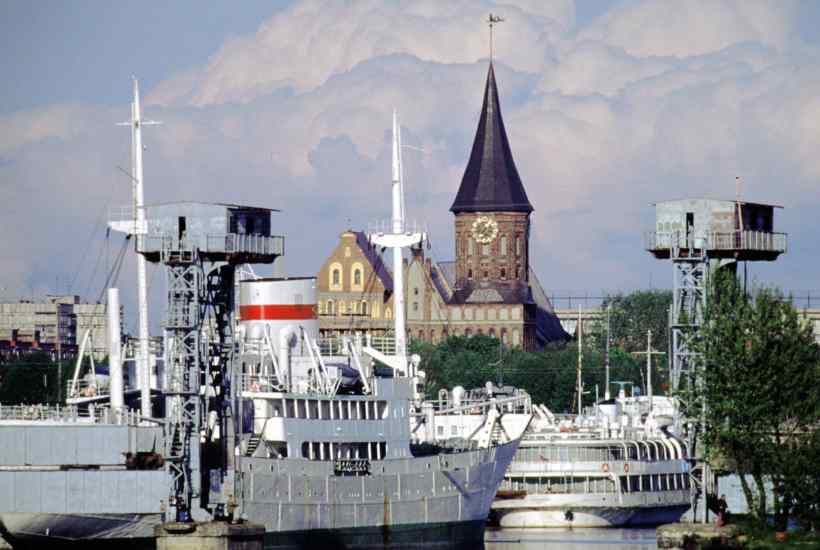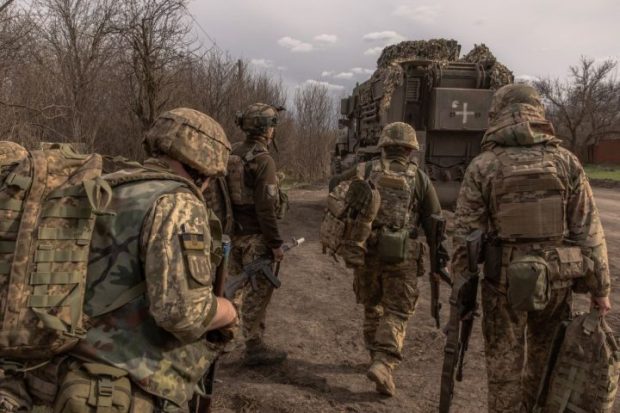When Russian troops started ‘military exercises’ on Ukraine’s borders, those of us living in Kyiv had grounds to worry. Putin operates by bluff, disinformation and false flags. He blows smoke, but sometimes his troops march through that smoke. That’s why we ought to pay attention to reports on Russian state media that there are to be military ‘manoeuvres in the Kaliningrad region,’ the Russian enclave sandwiched between Poland and Lithuania.
‘About 1,000 military personnel and more than 100 units of military and special equipment of artillery and missile units are involved’, says RIA News on its Telegram account. ‘Artillerymen and rocket launchers in Kaliningrad will carry out ‘several hundred firing missions’ using ‘Grad’ and ‘Uragan’ multiple rocket launchers, Hyacinth large-calibre cannons and self-propelled artillery units’, they add. There have been no official announcements to this effect; it may well be misinformation. But it fits a trend.
On Friday last week, Vilnius enforced EU sanctions that stop certain goods from being sent via EU territory – in this case, stopping Russia from sending building materials, steel and other metals via train to Kaliningrad. There has been recent discussion in Russian media about creating a corridor to the enclave – the so-called Suwałki Gap – to bypass Lithuania. Some regard this as Putin’s next military target and ‘Nato’s weakest point’.

The language in Moscow has been hardening. ‘This [goods blockade] can be assessed as direct aggression against Russia, literally forcing us to urgently resort to proper self-defence’, said Andrei Klimov, Russian senator. The agreement with the EU about simplified transit from Russia to the Kaliningrad through Lithuania has worked since 2002.
So what’s being stopped? According to the governor of the Kaliningrad region, Anton Alihanov, 40 to 50 per cent of trade between Russia and the enclave has been stopped by the EU. ‘This includes building materials, cement and metals,’ he said. Alihanov has also published a letter from the Lithuanian carrier LTG Cargo which explained that sanctioned goods cannot pass through EU territory even if they’re going from one Russian territory to another.
Moscow is threatening retaliation. ‘They must understand the consequences – and the consequences, unfortunately, will come,’ said an official from the Russian Ministry of Foreign Affairs on Russia-1 TV.
Lithuania has emphasised that the decisions were made in Brussels, not Vilnius. Gabrielius Lansbergis, the foreign minister (recently interviewed in The Spectator) said, ‘First of all, these are not Lithuania’s actions, they are European sanctions… steel and other products made of iron will no longer be imported through Lithuania, in consultation with the European Commission and in accordance with its guidelines’. Here is Arvydas Anusauskas, Lithuania’s defence minister:
The European Union has taken restrictive measures on certain goods moving from Russia’s mainland to Kaliningrad (steel and similar metal products). This was called a ‘blockade’ by Russia. However, in reality, the transit of passengers and goods (food, medicine, etc.) that are not subjected to EU sanctions continue to be transported to and from Kaliningrad through Lithuania… let’s not lose the ability to separate the disinformation and propaganda from real possibilities.
When it comes to Russia, separating truth from propaganda is becoming increasingly difficult. Those living in the Suwałki Gap risk being swallowed into Putin’s reality gap.
Got something to add? Join the discussion and comment below.
Get 10 issues for just $10
Subscribe to The Spectator Australia today for the next 10 magazine issues, plus full online access, for just $10.
Svitlana Morenets is a Ukrainian author, journalist and (currently) a refugee living in London and working at The Spectator. We are gauging interest in a regular email from her reporting on the Ukraine conflict and stories (like the above) which may not be reported in English-language media. To register your interest, please sign up here.




















Comments
Don't miss out
Join the conversation with other Spectator Australia readers. Subscribe to leave a comment.
SUBSCRIBEAlready a subscriber? Log in